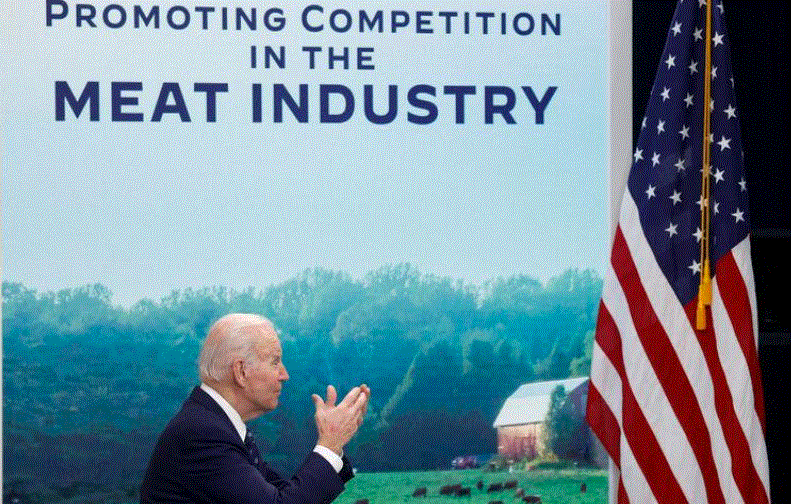Reuters - Leah Douglas
The United States will issue new rules and $1 billion in funding this year to support independent meat processors and ranchers as part of a plan to address a lack of “meaningful competition” in the meat sector, President Joe Biden said on Monday.
U.S. President Joe Biden holds a video conference with farmers, ranchers and meat processors to discuss meat and poultry supply chain issues, from an auditorium on the White House campus in Washington, U.S. January 3, 2022.
The initiative comes amid rising concerns that a handful of big beef, pork and poultry companies have too much control over the American meat market, allowing them to dictate wholesale and retail pricing to profit at the expense of their suppliers and customers.
“Capitalism without competition isn’t capitalism. It’s exploitation,” Biden said. “That’s what we’re seeing in meat and poultry industries now.”
A recent White House analysis found that the top four meatpacker companies - Cargill, Tyson Foods Inc, JBS SA, and National Beef Packing Co - control between 55% and 85% of the market in the hog, cattle, and chicken sectors.
The Department of Agriculture (USDA) will spend the $1 billion from American Rescue Plan funds to expand the independent meat processing sector, including funds for financing grants, guaranteed loans, and worker training, said Agriculture Secretary Tom Vilsack, who was speaking at an event with Biden.
USDA will also propose rules this year to strengthen enforcement of the Packers and Stockyards Act and to clarify the meaning of “Product of USA” meat labels, which domestic ranchers have said unfairly advantage multinational companies that raise cattle abroad and only slaughter in the United States.
Attorney General Merrick Garland, also speaking at the event, said “too many industries have become too consolidated over time,” and that the antitrust division of the Department of Justice has been chronically underfunded.
The Biden administration issued an executive order last year that advocated a whole of government approach to antitrust issues.
A central concern in agriculture has been meat prices, which have risen at a time when the White House is fighting inflation. An analysis in December by the White House economic council found a 120% jump in the gross profits of four top meatpackers since the pandemic began.
The meat industry has said the White House analysis was inaccurate and criticized the new plan.
National Chicken Council President Mike Brown called the plan “a solution in search of a problem.”
North American Meat Institute spokesperson Sarah Little said staffing plants remains the biggest issue for meatpackers and that the White House plan would not address it.
“Our members of all sizes cannot operate at capacity because they struggle to employ a long-term stable workforce,” she said. “New capacity and expanded capacity created by the government will have the same problem.”
Eric Deeble, policy director at the National Sustainable Agriculture Coalition, cheered the plan, calling it a “very positive step to ensure farmers and ranchers receive fair prices.”
The anticipated rulemaking under the Packers and Stockyards Act “could have a significant impact,” said Peter Carstensen, emeritus professor of law at University of Wisconsin-Madison and former antitrust attorney at the Department of Justice. But he noted that investment in independent processing itself would not address market concentration.
Austin Frerick, deputy director of the Thurman Arnold Project at Yale University, an antitrust research center, said the plan does not go far enough to tackle the power of the top meatpackers.
“I do not believe this (plan) will meaningfully change the concentration numbers,” he said.













